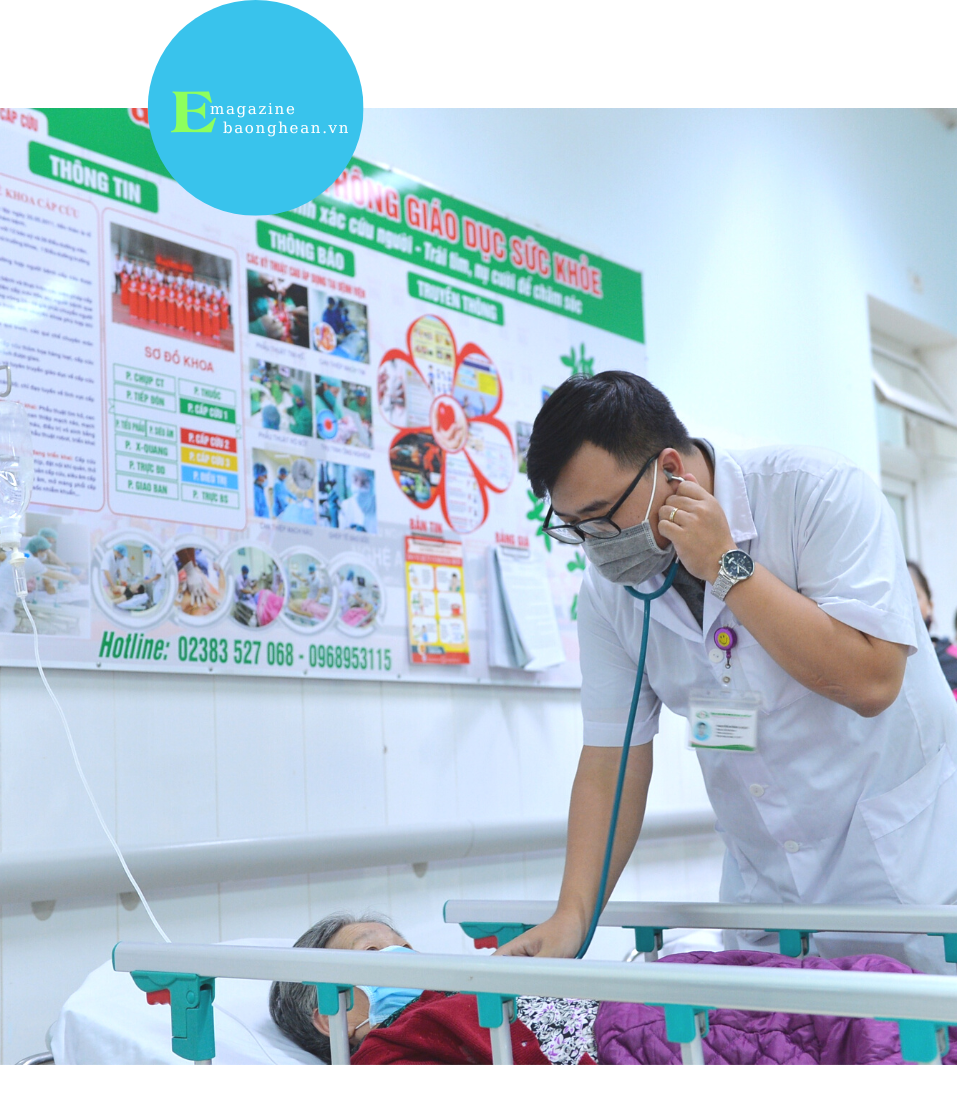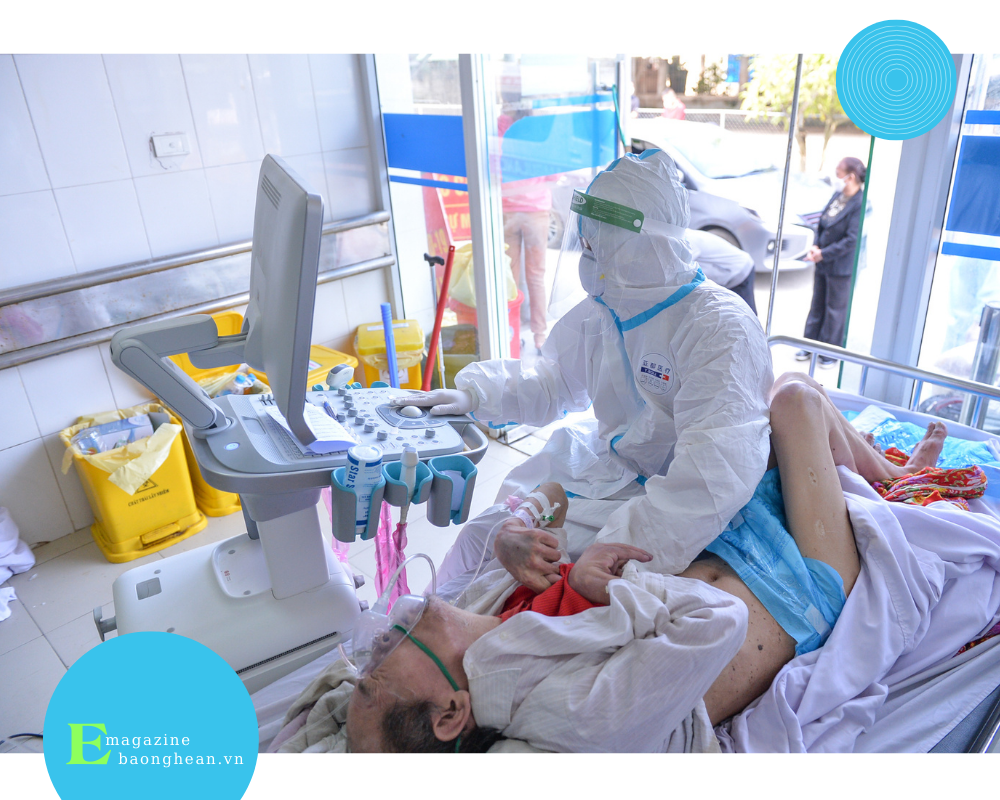




Receiving an invitation with promises from a little-known private hospital, Dr. NTH (32 years old) did not take too much time to think, then submitted his resignation. Although H. was being highly regarded and had a bright future at a large public hospital in Vinh City. “Over there (private hospital - PV), the working conditions are very good. The income is many times higher, it is really impossible to refuse,” Dr. H. said.

Dr. H. is one of hundreds of medical staff who have resigned from public hospitals since the COVID-19 pandemic began in Nghe An. According to a report by the Nghe An Department of Health, from the beginning of 2021 to June 2022, the total number of health workers who quit their jobs, resigned, or transferred to non-public health facilities was 119. Of these, 53 were doctors, 44 nurses, 4 medical technicians, 2 pharmacists, and 16 other professionals; 68 were at the provincial level, 42 at the district level, and 9 at the commune level.
Public health units with a large number of medical staff resigning or leaving their jobs include: Nghe An General Hospital with 19 people (4 doctors); Vinh City General Hospital with 12 people (11 doctors); Rehabilitation Hospital with 11 people (3 doctors); Nghe An Obstetrics and Pediatrics Hospital with 8 people (6 doctors), Nghe An Oncology Hospital with 7 people (3 doctors); Nghi Loc General Hospital with 5 people (4 doctors); Nghe An Endocrinology Hospital with 5 people (1 doctor); Quynh Luu General Hospital with 4 people (2 doctors)...

Mr. Nguyen Tung Lam - Head of the Organization and Personnel Department, Nghe An Department of Health said that in the first 6 months of 2022 alone, the entire health sector had 81 employees at public units quit their jobs, of which 75 were in the treatment system (32 doctors), 6 were in the reserve system (1 doctor). Of the total 33 doctors who quit their jobs, 21 continued to work at private hospitals and clinics, the rest for unknown reasons; 48 nurses, medical technicians, pharmacists and other health workers quit their jobs, 17 worked at private hospitals and clinics, the rest switched to other professions or stayed home to take care of their families.
The number of health officials and employees in public units in Nghe An who resigned or quit their jobs ranked second in the North Central region. Specifically, from 2021 to June 2022, Thanh Hoa province had 139 people (60 doctors); Ha Tinh had 32 people (17 doctors); Quang Binh had 23 people (11 doctors); Quang Tri had 23 people (8 doctors); Thua Thien Hue had 32 people (14 doctors)... The total number of health officials and employees in the North Central region who resigned or quit their jobs during this period was 368 people and the whole country was 8,402 people.
There are 3 common reasons why health workers resign or leave their jobs, including: Family reasons, family rationalization; resigning or leaving to open a private medical facility; transferring to work at private medical facilities, with higher income...
Statistics from the Nghe An Health Department show that out of 119 health workers who resigned, quit their jobs, or transferred jobs, 47 people did so for income reasons, 60 people did so for family reasons, and 12 people did so for other reasons.

To find out the reason, we met many doctors who had left public hospitals. Most of them said that the real reason for leaving their jobs was just the benefits. Salaries and allowances for health workers in the public health system are low, especially at preventive health facilities and primary health care facilities. Because at these public health service units, the main source of operating funds is guaranteed by the state budget, the career revenue is low.

In some health service units, autonomy in regular expenditures is granted (the source of salary and allowance payments for health workers is taken from the unit's career revenue through the price of health services). Because the price of health services for people with health insurance cards is low because it has not taken into account all the factors that make up the price of health services, the career revenue of the units is low. On the other hand, due to the impact of the COVID-19 epidemic, the revenue of health service units has decreased, leading to a sharp decrease in the income of health workers, and many units have even delayed the payment of salaries to health workers. This is also a major reason why health workers quit their jobs or leave their jobs to find job opportunities with higher incomes.
Medical staff and officials also worry about ensuring family life, ensuring minimum living conditions for food, clothing, housing, and worrying about the increasing costs of electricity, water, and education"... Many doctors bitterly compare the income of "humanitarian" doctors with the announcement of Hoang Anh Gia Lai Group recruiting veterinarians specializing in pig/chicken farming with a promised salary of 30-40 million VND/month.

According to the reporter's investigation, in fact, the story of health officials and employees resigning or leaving their jobs is not new, but has been "quietly" happening for many years, not just in 2021-2022. In Nghe An, this story began before 2010, when non-public health facilities began to appear in the area, inviting good health officials and employees in the public system with promised incomes 3 to 4 times higher, even 5 to 6 times higher than the income at public health facilities... In 2020, in Nghe An, 68 health officials and employees resigned. Of these, 43 were doctors (35 at the provincial level, 6 at the district level and 2 at the commune level).
A leader of Nghe An Department of Health said that if there is no good solution soon, in the future, the wave of health workers resigning and moving from public health facilities to non-public health facilities is likely to happen more often. “Previously, when doctors, pharmacists, and nurses graduated, they often tended to prioritize working at public health facilities. This priority comes from the fact that public health facilities have a good working environment; there are many conditions (number of patients; number of diseases; equipment; technical services) to develop and improve their skills. However, this has changed a lot now. At public health facilities, the number of patients and the workload of staff are overloaded. The intensity and time of work are increasing. The demands of patients are getting higher and higher, the pressure on health workers is very large…”, the leader of the Department of Health expressed his opinion.
Meanwhile, the concept of public and private healthcare is no longer as heavy as it used to be. The number of patients coming to non-public healthcare facilities is increasing, with many types of diseases. Non-public healthcare facilities operate very flexibly and professionally. With a flexible mechanism, these facilities can pay high salaries; quickly invest in machinery to develop technical services (according to doctors' requests). And even meeting the needs of medicines and medical examinations and treatments at non-public healthcare facilities is easier.


